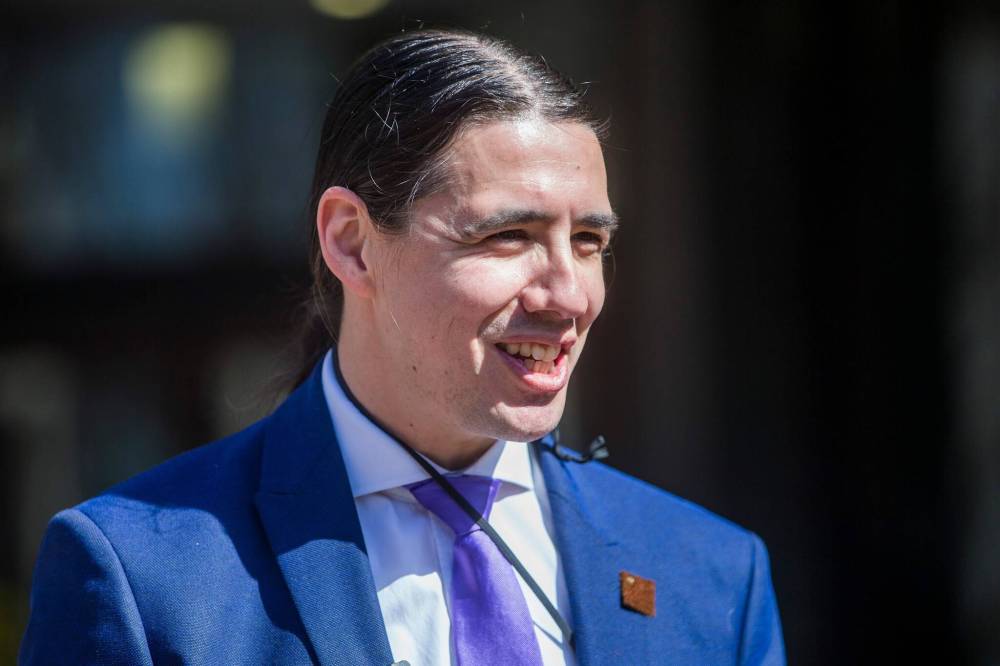Powerful council committee should be elected, mayoral candidate says
Advertisement
Read this article for free:
or
Already have an account? Log in here »
To continue reading, please subscribe:
Monthly Digital Subscription
$19 $0 for the first 4 weeks*
- Enjoy unlimited reading on winnipegfreepress.com
- Read the E-Edition, our digital replica newspaper
- Access News Break, our award-winning app
- Play interactive puzzles
*No charge for four weeks then billed as $19 plus GST every four weeks. Offer only available to new and qualified returning subscribers. Cancel any time.
Read unlimited articles for free today:
or
Already have an account? Log in here »
Hey there, time traveller!
This article was published 09/08/2022 (868 days ago), so information in it may no longer be current.
Members of city council’s most powerful committee should be elected by their peers, not appointed by the mayor, according to mayoral candidate Robert-Falcon Ouellette.
If elected, Ouellette promises to let city council vote for the next round of executive policy committee members. If he can’t immediately convince the province to change the city’s charter to permit that change, Ouellette said an informal council vote will be held, which he will finalize through mayoral appointments.
“It (would ensure) that the mayor doesn’t control all of council. Currently, one of the issues is that the mayor, using EPC (appointments and removals) is able to use kind of a carrot-and-stick method to really get through the policies that (the mayor thinks) are important. One person shouldn’t be able to decide everything,” he said.

MIKAELA MACKENZIE / WINNIPEG FREE PRESS FILES
Mayoral candidate Robert Falcon-Ouellette is proposing to switch to an EPC that is elected by council, instead of appointed by the mayor, if he gets elected.
Ouellette hopes to ultimately convince the Manitoba government to change the city’s provincially legislated charter to let council directly elect EPC members, without any mayoral decision.
The pledge may sound familiar to Winnipeg voters.
In 2014, Mayor Brian Bowman promised to let council elect the six members who would join him on the executive policy committee. Soon after he was elected, Bowman gave up on the idea because the city’s charter didn’t allow it.
Ouellette says he will fulfil the pledge, whether or not the provincial change comes.
“My word is my honour and I will follow through,” he said.
Ouellette believes an elected EPC would also help restore public trust in city hall, which he noted has been tested by real estate scandals in recent years.
“I think EPC has had a lot of closed-door meetings… If you start holding meetings with a few people and excluding others, I think at the end of the day it restricts the ability for some city councillors to even do their jobs properly,” he said.
Several council members have criticized what they call an “EPC-plus-two” scenario. Since Bowman first appointed six council members to join him on EPC and also appointed a deputy mayor and acting deputy mayor who don’t sit on EPC, he was accused of ensuring eight votes would match his on important council decisions. With the mayor included, they say that nine-member voting block was also given access to extra information and meetings.
“There are certain areas of the city that feel excluded from the decision-making process. I keep hearing from citizens saying the voice of my councillor doesn’t count at city hall … I think it’s really important to make sure that Winnipeggers have their city councillors represent their views and not those of the mayor,” said Ouellette.
However, others believe that a mayor-appointed EPC has some advantages.
Coun. Brian Mayes, who has sat on the committee throughout Bowman’s nearly eight years as mayor, said it could be tough to make decisions if the mayor had no control over EPC membership.
“You do run the risk of having an EPC that’s completely at odds with the person who’s just been elected city-wide (to be mayor) … I think the public wants the mayor to have some ability to get their agenda implemented,” said Mayes.
The councillor noted EPC members each handle a set portfolio, so allowing a mayor to keep the membership stable can also help councillors gain expertise in their roles.
Mayes said he does support new measures to be more inclusive of all elected officials, such as by hosting all-council budget sessions.
A local political expert said that EPC is the closest thing a Winnipeg mayor has to a cabinet, so removing the appointments could make it tough to fulfil mayoral campaign pledges.
“If they are appointed (to EPC) by a different means then by the mayor, (those politicians) have no requirements to adhere to the mayor’s communications line as well,” said Christopher Adams, a University of Manitoba political scientist.
On the flip side, Adams said EPC members could be deemed to have “greater legitimacy” by their council colleagues, if they are chosen by the group instead of the mayor alone.
Ouellette is one of 14 candidates to become Winnipeg’s next mayor. Election Day is Oct. 26.
joyanne.pursaga@freepress.mb.ca
Twitter: @joyanne_pursaga

Joyanne Pursaga
Reporter
Born and raised in Winnipeg, Joyanne loves to tell the stories of this city, especially when politics is involved. Joyanne became the city hall reporter for the Winnipeg Free Press in early 2020.
Our newsroom depends on a growing audience of readers to power our journalism. If you are not a paid reader, please consider becoming a subscriber.
Our newsroom depends on its audience of readers to power our journalism. Thank you for your support.





